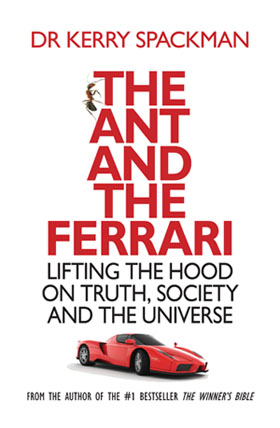|
My wife Denise got this book from the library, and, commandeering it, I managed to read most of it in one session, something I can't often do. "Scepticism and Critical Thinking 101" is one way of describing it, but the book covers cosmology, ethics, belief systems and other big topics in a way designed to get the reader thinking and then (hopefully) looking for more. Dr Spackman (a Kiwi) fills the text with engaging analogies that make some quite complex topics accessible to a wide readership. His introduction to Quantum Theory - a subject that makes everyone's head spin, including the people who developed it - is brilliant.
Dr Spackman covers territory that a number of greater names (Dawkins, DeBotton, et al) have addressed in depth, and he offers them as suggested readings not in an appendix but within the text, usually including a picture of the book cover. Gotta love that. (Also, footnotes are avoided, which is refreshing.) But Dr Spackman includes a lot of original thinking, and, in the final chapters, some realistic solutions to some of the real-world problems he's highlighted. The main reason I'm reviewing The Ant and the Ferrari here is that I believe anyone who is seriously interested in investigating paranormal phenomena needs to develop their critical thinking skills. These skills are, unfortunately, not only absent from the NZ school curriculum but, unless you pursue certain courses of study, aren't included in many university degrees either. (I would also recommend "Oddzone - Paranormal phenomena, alien abductions, animal mysteries, psychics and mediums and other weird kiwi stuff" by Vicki Hyde. New Holland Publishers NZ Ltd, 2006.) Entitled 'Something Spooky is Going On', Chapter 11 is a bit of an orphan in the book, but it is particularly interesting regarding the paranormal. Dr Spackman describes an uncanny encounter with a woman who divulges information to him that, apparently, she could only have acquired by mental telepathy. He introduces the chapter thus: "If you're beginning to think I'm a 'dyed-in-the-wool' scientist who has little room for 'mystical' experiences, you'd better fasten your seat belt, because we're about to take a radical change in direction. "I'm going to tell you about an experience I had that went against everything I had previously believed. I'd much rather it hadn't happened, because until then my view of the Universe made comfortable sense in my own mind. ... Suddenly my complacency came to a screeching halt. ... If anything it makes this book far more difficult to write and I would prefer that it hadn't happened." I was expecting a rational explanation for the event, or for Dr Spackman to discount the whole thing later in the book, but he doesn't. It would've been so easy for him to leave Chapter 11 out of the book entirely, epsecially as it doesn't vitally connect with any of the other themes discussed, but I love that it's there, even though it will leave him open to ridicule by hardcore sceptics. Accounts of paranormal experiences are quite common; I reckon about every other person has had something unexplained happen to them; but when someone as clear-thinking and (you would expect) otherwise not disposed to having paranormal experiences is prepared to publish one, it counts for a lot. You'll have to acquire the book to read the account, as I'm not going to quote any of it here. Happy reading. Links:
0 Comments
Leave a Reply. |
Ectoplasmic Residueis a blog by James Gilberd - leader and co-founder of Strange Occurrences. Views expressed here do not necessarily represent those of the Strange Occurrences team. AuthorJames Gilberd is an amateur paranormalist, writer and musician, and a professional photographer, living in Wellington, New Zealand. Archives
February 2021
Categories
All
|

 RSS Feed
RSS Feed
